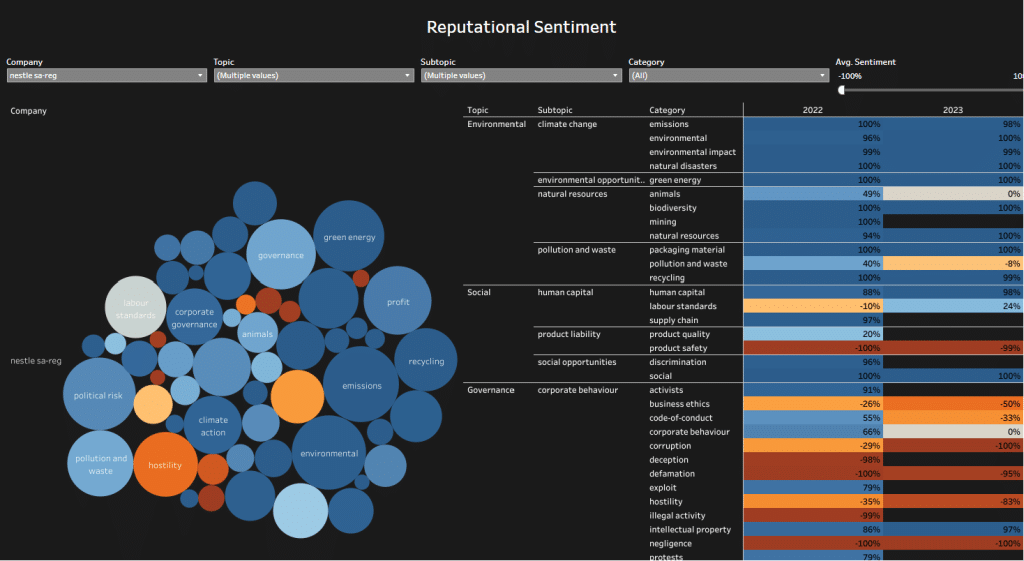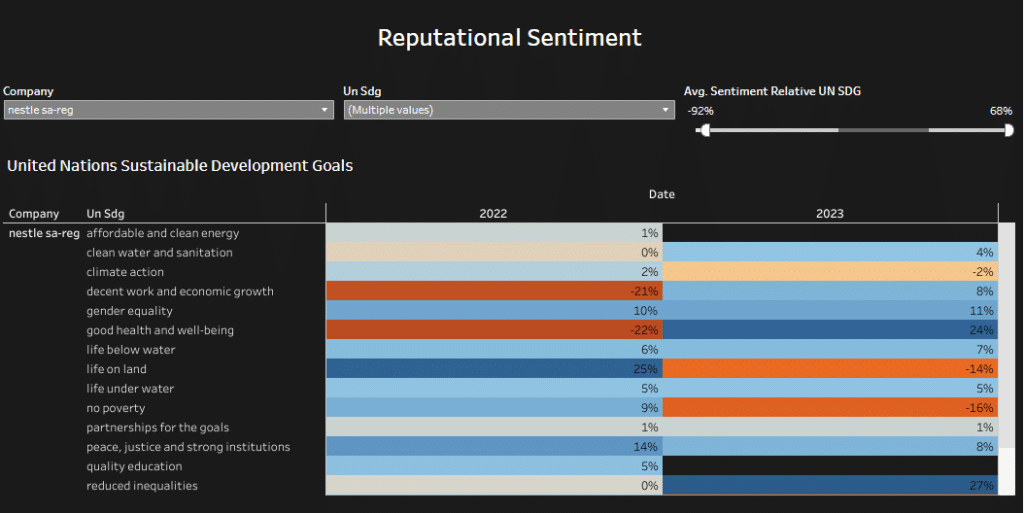In today’s rapidly changing world, businesses are increasingly being scrutinized not only for their financial performance but also for their impact on the environment, society, and governance practices. This holistic approach, known as Environmental, Social, and Governance (ESG), has gained significant traction in recent years. Nestle, a global leader in the food and beverage industry, has been at the forefront of implementing sustainable practices and has achieved an impressive ESG score. This article will delve into the Nestle ESG score, compare it to industry standards, and explore the impact of its initiatives on the environment, communities, and the overall industry.
What is Nestle’s ESG Score?
Nestle’s ESG score is a measure of the company’s performance in the areas of environmental sustainability, social responsibility, and governance practices. It is a comprehensive assessment that takes into account various factors, including carbon emissions, water usage, waste management, labour practices, community engagement, board diversity, and transparency in reporting. According to our ESG intelligence at time of writing, the Nestle ESG score comes in at 93 for environmental factors, 74 for social factors and 62 for governance factors.
Nestle’s commitment to environmental sustainability and social responsibility is reflected in its high ESG score, which showcases its dedication to driving positive change and minimizing its impact on the planet and society.

How Nestle’s ESG Score Compares to Industry Standards
Nestle’s ESG score stands out when compared to industry standards. The company has consistently ranked among the top performers in the food and beverage sector, showcasing its commitment to sustainable practices and responsible business operations. Nestle has set ambitious targets to reduce greenhouse gas emissions, conserve water resources, and achieve zero waste. By exceeding industry benchmarks, Nestle has demonstrated its leadership in driving sustainability and inspiring other companies to follow suit.
The Impact of Nestle’s ESG Initiatives on the Environment
Nestle’s ESG initiatives have had a profound impact on the environment. The company has taken significant steps to reduce its carbon footprint, with a particular focus on transitioning to renewable energy sources and improving energy efficiency in its operations. Nestle has also implemented sustainable sourcing practices, ensuring that its agricultural supply chains are environmentally responsible and promote biodiversity. These efforts have not only reduced Nestle’s environmental impact but also inspired its suppliers and competitors to adopt similar practices, leading to a collective positive change across the industry.
Nestle’s commitment to sustainable packaging is another area where it has made a tangible difference. The company has been actively working towards eliminating single-use plastics from its packaging and promoting recyclability. By investing in innovative packaging solutions and collaborating with stakeholders, Nestle has set a precedent for responsible packaging practices that prioritize the planet’s well-being. This commitment extends beyond the company’s own products, as Nestle actively engages with policymakers and industry associations to drive systemic change and promote circular economy principles.
Nestle’s Social Responsibility Efforts and Their Impact on Communities
Beyond its environmental initiatives, Nestle has also prioritized social responsibility and community engagement. The company recognizes the importance of supporting local communities and empowering individuals. Nestle has implemented various initiatives to improve the livelihoods of farmers and small-scale producers in its supply chains, ensuring fair prices, access to training, and promoting sustainable agricultural practices. Through partnerships with organizations and NGOs, Nestle has made a significant positive impact on communities by addressing social issues such as poverty, education, and nutrition.
One notable example is Nestle’s commitment to providing clean drinking water to communities in need. Through its “Nestle Pure Life” initiative, the company has installed water purification systems in areas where access to clean water is limited. This has not only improved the quality of life for countless individuals but has also helped to prevent waterborne diseases and promote better health outcomes. Nestle’s dedication to social responsibility is not just a corporate responsibility but is ingrained in its values and has become a driving force for positive change.
Governance Practices at Nestle and Their Influence on the Company’s Success
Governance practices play a crucial role in ensuring transparency, accountability, and ethical conduct within a company. Nestle’s governance practices have been instrumental in maintaining its high ESG score and driving its success. The company has implemented robust internal controls, risk management systems, and compliance frameworks to ensure business integrity and responsible decision-making. Nestle’s board of directors comprises individuals with diverse backgrounds and expertise, promoting a culture of inclusivity and effective oversight.
Transparency and disclosure are also key aspects of Nestle’s governance practices. The company regularly publishes comprehensive sustainability reports that provide detailed insights into its ESG performance and progress. By sharing this information openly, Nestle builds trust with its stakeholders, including investors, consumers, and the wider public. This transparent approach has been recognized and praised by industry experts, further enhancing Nestle’s reputation as a leader in corporate governance.


Challenges Faced by Nestle in Maintaining a High ESG Score
Maintaining a high ESG score is not without its challenges, and Nestle is no exception. The company operates in a complex global landscape, facing diverse environmental and social issues across its value chain. Nestle recognizes that sustainability is an ongoing journey and continuously strives to address challenges and improve its performance. Some of the challenges Nestle faces include ensuring sustainable sourcing of raw materials, reducing water usage in water-stressed regions, and addressing labour practices within its supply chains. By acknowledging these challenges and actively working towards solutions, Nestle demonstrates its commitment to continuous improvement and long-term sustainability.
The Significance of Nestle’s ESG Score for the Industry
Nestle’s impressive ESG score holds significant importance for the food and beverage industry as a whole. It serves as a benchmark for other companies, inspiring them to adopt sustainable practices and prioritize ESG considerations. Nestle’s leadership in sustainability has challenged industry norms and set a higher standard for responsible business operations. By sharing its knowledge and experiences, Nestle contributes to the collective progress towards a more sustainable and responsible industry.
Nestle ESG Score Peer Comparison
Nestlé’s ESG score is generally considered to be good relative to its peers in the food and beverage industry. See how they compare to their competitors below:
– The Coca Cola company ESG score
– Mondelez International ESG score
– The Hershey Company ESG score
Conclusion: Nestle’s Role in Driving Sustainability in the Industry
Nestle’s commitment to sustainability, as reflected in its impressive ESG score, has positioned the company as a global leader in driving positive change within the food and beverage industry. Through its environmental initiatives, social responsibility efforts, and robust governance practices, Nestle has made a significant impact on the environment, communities, and the industry as a whole. By setting ambitious targets, collaborating with stakeholders, and sharing best practices, Nestle inspires other companies to embrace sustainability and work towards a more sustainable and responsible future. As the world continues to face environmental and social challenges, Nestle’s role in driving sustainability becomes increasingly crucial, paving the way for a better tomorrow.
Find Out More
Are you looking for more granular data on Nestle’s ESG practices?
